Election Dissection 2016
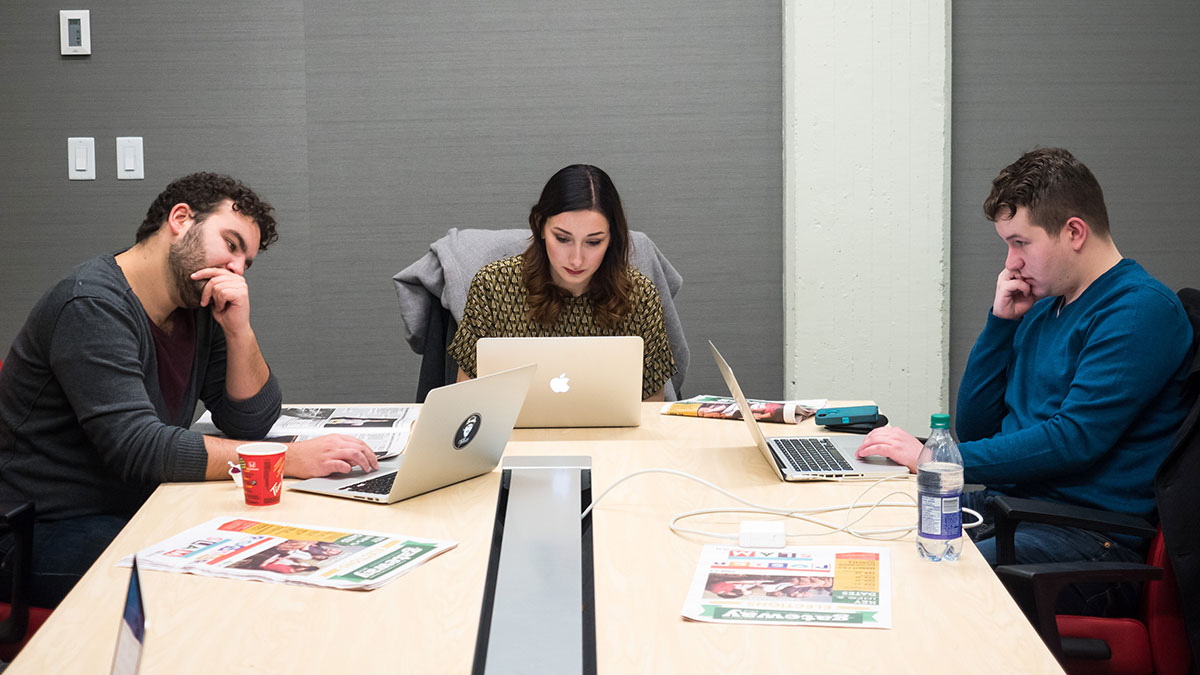 Ab Sch
Ab SchAh, Students’ Union elections. Whether you think it’s the best — or worst — time of the year, there’s no denying things can get a little complicated. But there’s no need to get overwhelmed before hitting the ballot box when you can get the inside scoop on who’s who right here. Let our panel of three SU experts weigh in on who will — and who should — represent you in 2016-17.
Meet the Panel
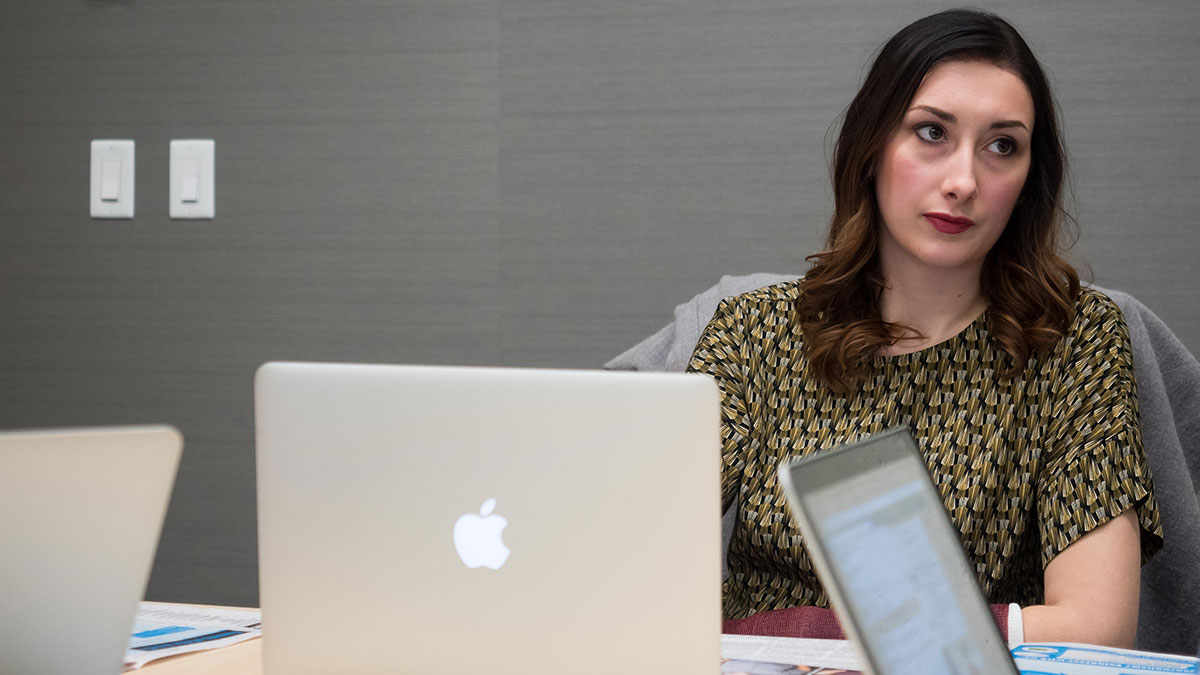
Kate Black was the Gateway’s Managing Editor for the 2014-15 publishing year and Online Editor in 2013-14. She’s a fifth-year Women’s and Gender Studies and Political Science student, the Vice-President (External) of the Political Science Undergraduate Association, and never passes up an opportunity to chat about the latest SU drama.
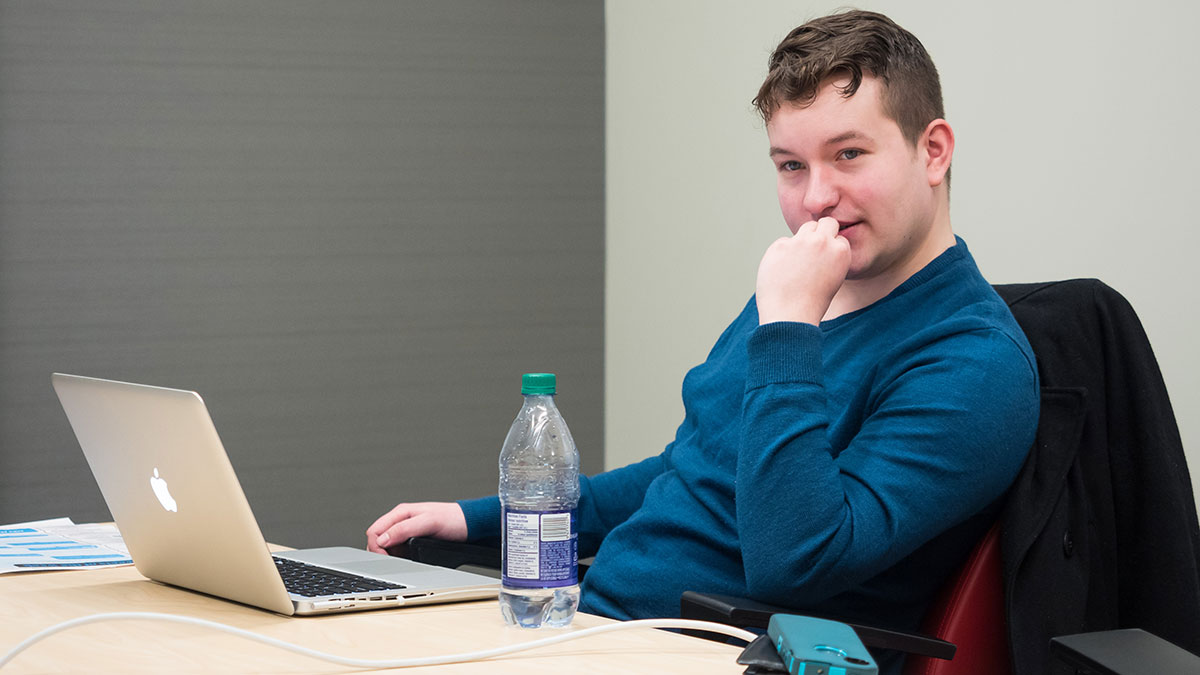
Adam Woods is a former Faculty of Arts student councilor, GFC Representative, SU Vice-President (External) and general agitator of those in positions of authority. He is thoroughly enjoying his victory lap, and damn happy he isn’t running in this election.
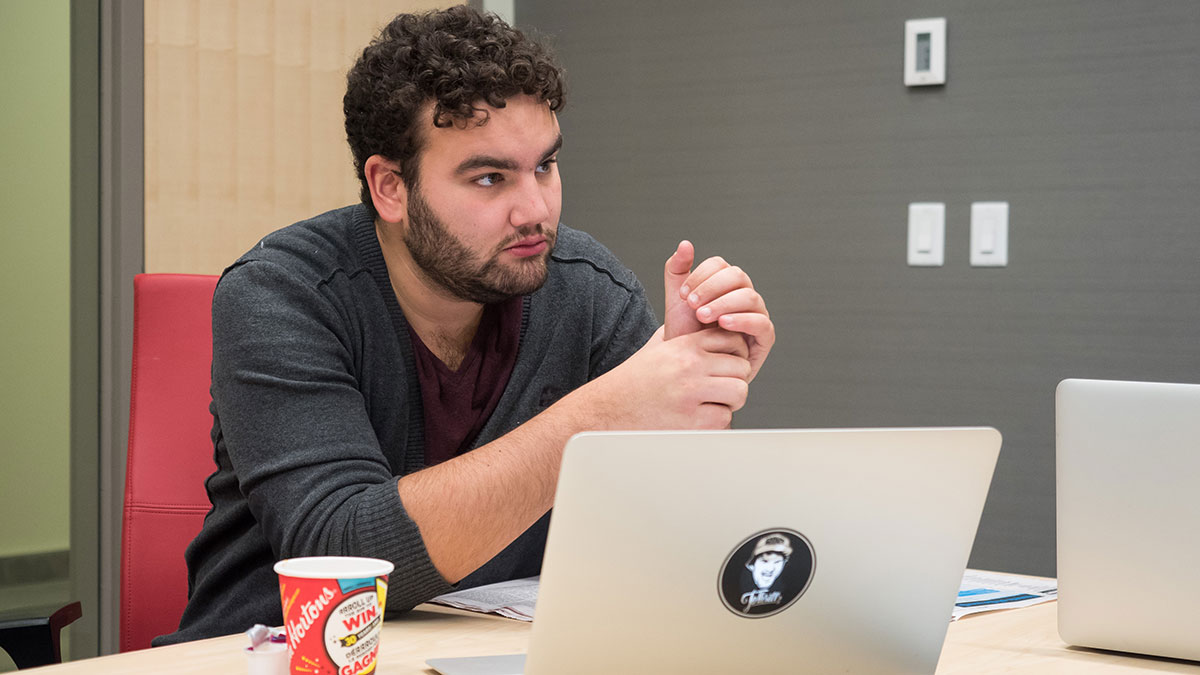
Elliott Tanti is in his final year of his honours political science degree. He’s been involved in and has run several SU election campaigns, and is an avid follower of SU politics. Elliott works in digital communications strategy and hosts the politics podcast Highlevel Showdown.
President
In one of the most competitive presidential races in recent memory, the panel unanimously agreed that all three candidates would make adequate leaders if elected.
Woods started the debate saying that there are certain years where a specific VP portfolio would make a better incoming president. For Woods, 2016-17 doesn’t seem to be one of those years, which made this race “up in the air.”
“I think this is a hell of a race,” Adam Woods, former SU VP (External) said. “Whoever wins is going to do an amazing job.”
“This is interesting, because all three candidates come from existing leadership,” Elliott Tanti added. “A lot of students will make decisions on how they’ve seen these people work in their current positions or directly one-on-one.”
The panel started by analyzing Bondarchuk’s campaign trail. Kate Black said she thought all his ideas were exceptional, such as gender equality, and that he was running the most visible campaign, but she was concerned with his 12 platform promises and to what extent he can complete them during a one-year term.
“It becomes a question of priority,” Tanti added to Black’s thoughts. “But if everything is your priority, nothing is your priority. I think that is a valid concern.”
All three candidates included tuition policy in their platforms and “hit all the right points,” but Woods said with the NDP government, this isn’t the year for the president to make it a priority.
“We should be advocating on it, obviously, but the president should support the other VP’s on the things they’re working on,” Woods said. “Tuition review is something we need to do, but we have three more years to do it. Unfortunately, with one-year terms, you have to realize this is better off for someone else to do.”
“The president’s focus (and vision) should be on campus,” he concludes.
And on campus is where Rahman’s experience lies. Woods called Rahman “one of the smartest policy people I know,” and lauded his efforts working as this year’s VP (Academic). However, the panel questioned his platform point on prioritizing experiential learning over issues in residence, which Woods called one of the biggest issues the SU president will face all year.
Another area where Rahman falls behind Bondarchuk and Hanwell is in the charisma department, and the ability to engage the student body and make them care about issues the SU faces, the panel said.
Bondarchuk has the “outgoing personality that can rally students,” but Tanti said Hanwell is best suited to engage in difficult conversations with the campus community. While he doesn’t have the “flash and bang” of Bondarchuk’s visibility and effective campaigning, Hanwell offers an intriguing combination of policy knowledge and public perception.
“I really value someone who is going to represent me well,” Black said. “And someone who is going to get along with the university and respect the university.”
“Cody is the most visible and outspoken, but I still feel like I would trust Dylan more to be the first person to respond to an issue,” Tanti added.
The panel turned back to Bondarchuk, as Tanti brought up the inflammatory political comments posted on his Facebook last summer and his public affiliation with a provincial political party. They wondered whether that incident would affect voters.
“I wonder if that’s in the back of people’s minds,” Tanti asked. “He proceeded to defend it and further the issue. That’s not how you deal with it.”
“Partisanship is important,” Woods said. “Everyone has voted, but you can’t really take sides like that. It’s something that can really affect (the SU’s) relationship with a party.”
Woods ended the discussion commending the candidates for running a friendly and respectful campaign, and acknowledged that camaraderie can be difficult to maintain during the two-week fight.
“The only way this could be a better race is if (current VP (SL)) Vivian Kwan ran as well,” Woods said.”
Will Win
Cody Bondarchuk — two votes
Undecided — one vote
Should Win
Dylan Hanwell — three votes
Vice-President (Operations and Finance)
The panellists were quick to dismiss the other candidates, and agreed that Robyn Paches was the only solid choice for VP (Operations and Finance).
“Contrary to the President race where I think that all of them could win and do a good job, I think that there’s one person who should win and would do a good job,” Black said.
Woods agreed, saying that “it goes from a three person race to a two person race pretty quick, and then right after that it goes to a one person race even faster.”
The first candidate the panellists dismissed was Hasan Birer, whose platform points they said were either part of the VP (Operations and Finance) job description already, or weren’t well researched, such as the case of increasing student discounts.
“He needs to understand what the point of a Students’ Union is. I’m all for discounts for students, but that’s why our prices are so cheap. That’s why we run at cost here, so that everybody gets discounts,” Woods said.
The second candidate to be dismissed was Taimur Malik. Woods pointed out that Malik’s policy came out on Thursday, days after campaigning began. He said that candidates shouldn’t be coming up with ideas after deciding to run.
“I want you to have ideas and then be like, ‘hey, I should run and implement these ideas!’ That’s how you’re supposed to do it,” Woods said.
Tanti felt that Malik’s campaign had so far largely been focused on personality and image, which is something “that’s missing oftentimes” and “one of the most difficult things to do.”
“The problem is once you recognize a personality and you open up that door, it’s what’s behind the door,” Tanti said.
The panellists were concerned that Malik’s increased visibility would lead students to vote for him without taking a look at Paches’ platform.
“Look past the first person,” Tanti said. “We really just want students to take a good hard look at this race — and a good hard look is five minutes.
“If you’re running Taimur’s campaign, you’re trying to hide the fact that this guy’s going to be responsible for an $11 million budget, where with Robyn, you’re actually encouraging that detail to be known. I think that’s huge.”
The panellists noted that Paches had already been doing a large part of the job required of the VP (Operations and Finance).
“He chairs the audit committee which reviews the Students’ Union,” Black said. “He sits on the finance committee, which approves the DFU dispersement and creates the budget for next year’s Students’ Union.”
“He’s already clearly thought about what he wants to do,” Woods added.
They also looked favourably at his platform points, which Tanti said were “clear and open.”
“It’s fresh and healthy food options, sustainable development, and student safety.” Tanti said, “You can get behind those things, and he talks about those things in depth.”
“He’s not just reiterating things that we’ve heard before. Even I’ve never thought about running an awareness campaign about sexual harassment at the PAW centre. He holds the balance between innovation and also maintaining and fixing the things we all know should be fixed,” Black said.
Will Win
Taimur Malik — two votes
Robyn Paches — one vote
Should Win
Robyn Paches — three votes
Vice-President (External)
Experience became the focus of the VP (External) race, with Patrick Cajina holding a significant advantage over his opponents Mike Sandare and Reed Larsen, the panellists agreed.
Cajina, who was named the SU’s Advocacy Outreach/Camapaigns Officer from May 2014 to April 2015, was in charge of acting as a liaison between the SU executive office and the student body, coordinating advocacy campaigns of the SU and recruiting for their advocacy teams during his term.
Woods, who served as the SU’s VP (External) in 2013–14, said the AOCO position isn’t necessarily a prerequisite for an SU executive position, but it’s the experience in the SU that makes Cajina an attractive candidate in the three-way race.
“You end up getting a vast understanding of the VP (External) role, and you’re with the VP (External) almost every single day,” Woods said. “(Cajina) has that institutional memory. It’s a huge advantage in getting the job, and being able to just do it.”
He added that should Sandare and Larsen get elected, they would have a difficult break-in period due to lack of contextual SU knowledge and experience. Although, Woods did applaud Larsen’s platform, and said that the candidate, “for the most part, knows about the right issues,” his concern was that a candidate should have a better understanding of the SU before they lead an organization.
“It’s often a risk to be part of an organization that you haven’t been a part of,” Woods said.
Tanti disagreed with Woods on the point that prior SU knowledge is crucial when it comes to a VP position, but said Larsen hasn’t done a good job of highlighting what non-SU experiences make him fit for the position.
The panel said they were impressed with Sandare’s passionate campaign, but agreed that he was too green for a VP position this year, and is an energetic name to watch down the road.
“He has really good soft skills, and is a great public speaker,” Black said of Sandare’s Debate Club background. “If he can get elected to Students’ Council, he can gain more hard skills.”
“He seems like the kind of guy where this is his first kick at the can, will learn a lot and come back 10 times stronger,” Tanti added. “He’s someone to watch for sure. He’s really put together, and he has the basis of someone who is really strong. It’s just not his time.”
Woods went on to critique Sandare’s platform, which had “2.5 platform points,” and that “he needs to learn more about the portfolio.”
As for Cajina’s platform, Black said she was “off-put” by Cajina’s insistence on lobbying the federal government with the creation of the Federal Post-Secondary Learning Act.
“Anyone with a basic understanding should know that implementing a national post-secondary plan is a) non-constitutional and b) not realistic,” Black said.
“But the end of the day, they’re doing provincial advocacy, and I believe he can do that quite well.”
Will Win
Patrick Cajina — three votes
Should Win
Patrick Cajina — three votes
Vice-President (Academic)
Panellists agreed that the VP (Academic) race was one of, if not the most competitive races in this year’s SU Executive election.
All three praised Banister for her visible and well-run campaign, which could appeal to voters on March 2 and 3.
Tanti said he initially thought Banister was a clear-cut choice, but after examining Patrick’s platform and performance in forums, he realized “this is much closer than I thought it would be.” Patrick’s platform points were praised for being specific and detailed. Tanti then referenced a debate at the second SUBstage forum, where Banister proposed that professor salary negotiations be based on USRI’s, and Patrick negating her, as his response was based on the fact that evaluation submissions have declined since the university switched to online only.
“They’re debating very specific policy,” Tanti said. “It speaks to their knowledge, and the fact that the two candidates are pushing each other.”
“You don’t always see policy debate between two candidates,” Woods said. “I would love to see these two go at ‘er, and just argue about academic policy.”
Banister mentions more course packs, while Patrick is advocating for the elimination of intro-level textbooks. Both mention student faculty association representation and that they plan on increasing influence from student perspectives. Both also tout experience to back up achieving those goals, including Banister sitting on Students’ Council and the Council of Faculty Associations (COFA), while Patrick’s experience on COFA was minimal, with him sitting in at their most recent meeting.
But Banister’s experience edges Patrick’s by quite a margin, Tanti said.
“What is really making me go one way or the other is Banister’s experience in every level of student governance,” Tanti said.
“This is a really important year to talk about Faculty Associations and Department Associations,” Black said. “I’ve seen the Faculty of Arts association dissolve … for me, one of those priorities should be revamping and expanding those transitions. I think that’s something Banister (the current Political Science Undergraduate Association President) can speak to best.”
“She’s probably checked every experience box at this point,” Woods added. “She didn’t just get experience, she got all the experience … but (Patrick) is still in this race.”
The panel also addressed rumours that Banister was considering running for president before she nominated herself for VP (A).
“How does that dynamic fit when she may think she knows better?” Tanti asked. “And let someone take the lead on a project.”
Black said had she not known of Banister’s experience as City of Edmonton Youth Council Chair, she also would have questioned the candidate’s malleability and flexibility when it comes to dealing with certain issues. She went on to say that while Banister has done well to seem polished and prepared, it may hurt her, as she may come off as over-rehearsed.
Either way, each candidate would do a “phenomenal job” if elected, Woods said.
“This is the one I’ll be watching for sure,” Woods said. “This race will come down to who shook the most hands.”
Will Win
Marina Banister — two votes
Undecided — one vote
Should Win
Marina Banister — two votes
Undecided — one vote
Vice-President (Student Life)
Residence talk, with the university stating earlier this year that they will no longer collect membership fees, has dominated much of the VP (Student Life) campaign trail, and the dialogue between the Dissection panel was no different.
Woods said whoever is named VP (SL) needs to be willing to “burn it all down,” and start from scratch, which he believed Simao has iterated effectively throughout his campaign.
“Jordan has made it clear that’s what he’s going to do,” Woods said. “He comes from a residence background, and has lived in residence. I think he will be able to change the issue.”
Simao earned points from the panel for his thorough platform, especially for his stance on the Sexual Misconduct Review Group, which caught the eye of Black, Tanti and Woods. Simao is advocating for drafting a university policy that “expresses the depth and importance of this issue to students.”
“How we handle sexual assault is huge,” Woods said. “The fact that he even mentioned that made me very happy.”
“That’s what made me realize that this is a serious candidate,” Tanti added.
But Woods argued that Kevin Wang’s platform was more detail-oriented, specifically speaking to his elaborate platform points and how he would achieve each goal. However, his stance of changing student programming, namely Week of Welcome Orientation, which was already changed to a one-day event just this year, concerned Black.
“That’s a huge group of people who are already in charge of orientation,” Black said. “I think it’s a misplaced platform point. From what I’ve seen, Kevin hasn’t navigated that system. You should have some understanding of it.”
“In order to present a solution to the problem, you have to present the problem,” Tanti added, regarding orientation. “The problem with some of these points is that they present something grandiose. But you first have to tell us really what’s wrong with it.”
Francesca El Ghossein also presented a well-developed and well-thought platform and slew of ideas, along with adequate experience, the panel said. Tanti especially liked El Ghossein’s point on advocating for more student autonomy in the management of Student group disclosure, which would divert Event Risk management to the SU, and away from the Dean of Students.
Tanti said that he felt Flaman started recognizing the importance of residency during his campaign, and jumped on the bandwagon.
“This incoming VP (Student Life) will have all this extra baggage,” Tanti said. “The more experience they have with residence issues and more experience with the players, the better. These are the people you want to have some rapport with to get a win, which is hard enough.”
Levi Flaman, the current Open Studies councillor, was dismissed as a “one-trick pony” with his advocacy regarding the U-Pass. Because the panellists had a difficult time locating Flaman’s platform points due to lack of a website, they said voters would likely be left with the same dilemma.
“I don’t want to discriminate against candidates who don’t have a website, but you have to communicate how you’re going to achieve these things,” Woods said.
In closing, Tanti said he’s disappointed that residence issues have taken over the election, and said while these issues impact a large group of students, other issues, such as mental health which he said impact more students, could get lost in the conversation.
Woods said the problem with residence this year is that it is an “absolute shit show,” and needed to be addressed quickly. Black said if the incoming VL (Student Life) addresses the residence situation adequately, future candidates won’t have to use residences as their primary platform point.
“It would be good to build up some representation, so we don’t have to say ‘how is the VP (SL) going to take care of residences?’ every year,” Black said.
Will Win
Jordan Simao — three votes
Should Win
Jordan Simao — two votes
Francesca El Ghossein — one vote
Undergraduate Board of Governors’ Representative
Though just one candidate is running uncontested after Umer Farooq dropped out just hours after the election season began, all three panellists endorsed Colin Champagne as next year’s BoG rep.
“We need to be able to work with the SU president and sometimes take directions from them, while also being an autonomous BoG Rep. But sometimes you need to be able to sit down with whoever is elected regardless and say, ‘lets just hash this out,’” Woods said. “And I think Colin is the guy to do that.”
Champagne, who is Association des Universitaire de la Faculté Saint-Jean President and a former Campus-Saint Jean student councillor, has the experience at the governance level to do the job, and do the job effectively, the panellists agreed. Even if Farooq ran against Champagne, they all said they would have voted for Champagne regardless.
“My feeling is that he has a deep understanding of the position and what is expected,” Tanti said. “I think you want a contested race, but unlike last year, this is a good candidate to run by themselves.”
Will Win
Colin Champagne — three votes
Should Win
Colin Champagne — three votes
The Gateway “Yes” Plebiscite
At one point in his academic career, Woods would have voted “no” and been happy with cutting off The Gateway’s Dedicated Fee Unit funding, which collects $3.39 from students every Fall and Winter semester.
“As an angsty executive who was criticized by The Gateway a lot, I will admit that it is good to have an autonomous and independent newspaper that is free to say whatever they want without any repercussions,” Woods said. “It’s an integral part of the U of A’s history and I think that more than ever, if we want to protect that, students should vote ‘yes’.”
If The Gateway did not choose to change their organizational model to cease weekly print publication and shift to an online model, Black said she would have thought differently about how to respond to the question.
“It is really important that The Gateway has demonstrated that they’re adapting to the changing media landscape, and be that voice for students,” Black said. “There really is nothing like The Gateway to keep students accountable and let them know what’s happening on campus.”
However, Black did say that the campus media source has to stay relevant with their campus focus in order to stay relevant to students, who are paying this fee, as many students consume media on social media.
Tanti, who did his thesis on media and media concentration in Canada, said The Gateway is “fundamental to the life and culture here at the U of A.” He applauded The Gateway attempting to adapt to the changing digital media climate, and support a “free, democratic campus.”
Will Win
Yes — two votes
No — one vote
Should Win
Yes — three votes
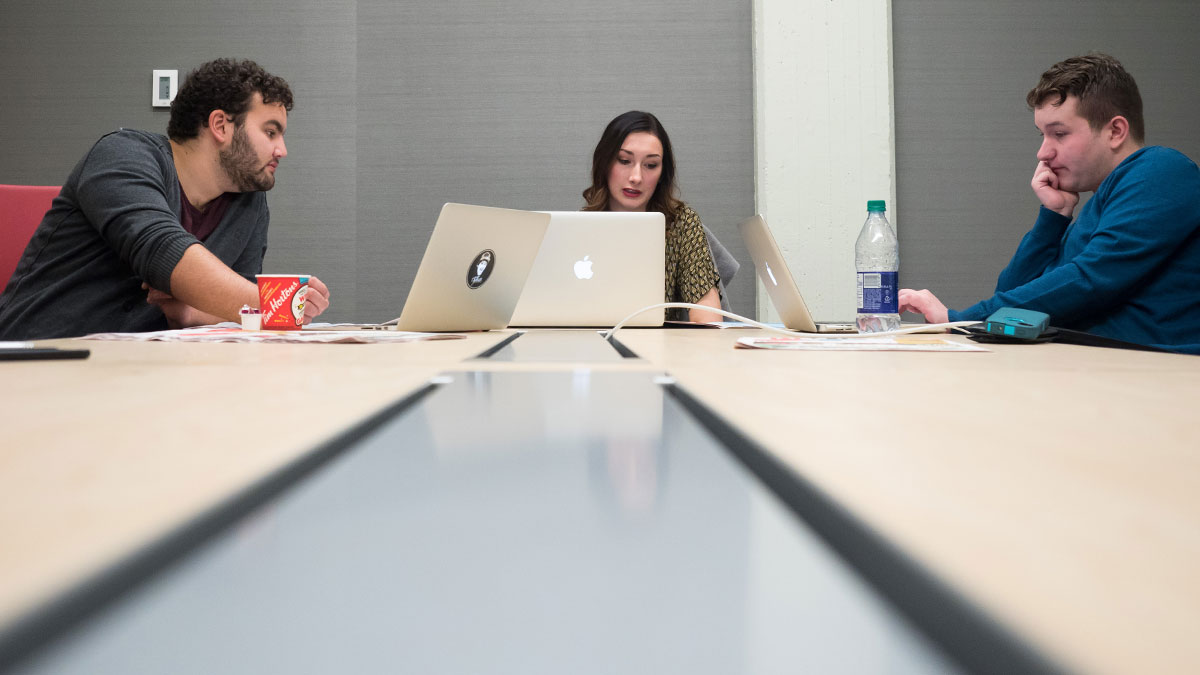
Correction: A previous version of this article stated that Francesca El Ghossein didn’t include any note of residence issues in her platform. This has been retracted, The Gateway regrets this error.




